Stock Exchanges and Market Regulators
A Gateway to Sustainable Finance for Emerging Markets
INSIGHTS
Market regulators and stock exchanges play a critical role in strengthening disclosure requirements and attracting capital in emerging markets, ensuring that local standards on environmental, social, and governance (ESG) transparency are aligned with international good practices.
1. Role of Capital Markets for Development
Capital markets in developing countries—many still in their infancy—hold great potential to channel private capital toward priority development needs. Strong local capital markets are essential for a thriving private sector. They help people and businesses obtain long-term financing. They encourage the kind of entrepreneurial risk-taking that fosters innovation and accelerates job creation and economic growth. They can shield entire economies against potentially destabilizing fluctuations in international financial markets.
2. Importance of Disclosure and Transparency
In developing countries, an insufficient flow of private capital often limits economic and social development, partly because of a heightened perception of risk in these countries, compounded by a lack of information or transparency or limited price discovery. Transparency and disclosure help companies in emerging economies access global capital markets and global investors to improve pricing the risk of investing in these markets.
3. Promoting Sustainable Finance
Stock exchanges that promote a higher level of ESG disclosure and transparency can create market mechanisms that promote sustainable finance, such as sustainability indexes that track the performance of equity or bonds of companies with higher ESG performance, or sustainable bond listing segments that list exclusively sustainable finance debt securities. These mechanisms make ESG investments more accessible, credible, and structured for investors, enabling them to benchmark the performance of their investment portfolio. They also provide a basis for passive investment funds such as exchange traded funds (ETFs).
VIDEO – Watch the Sustainable Stock Exchanges TV interview with Martine Valcin, global manager of IFC’s ESG Advisory, Knowledge, and Learning.
IFC'S WORK
IFC's Work: Building Ecosystems for Corporate Governance and Sustainability
IFC works with market regulators and stock exchanges in emerging markets to develop customized regulatory and quasi-regulatory ecosystems that promote corporate governance and sustainability and help attract investments. It does so through regional advisory programs and its partners and networks such as the UN Sustainable Stock Exchanges Initiative, Sustainable Banking and Finance Networks, and others.
Countries originally developed corporate governance codes as complementary to laws and regulations on corporate governance. Over time, other tools have been introduced to create a more comprehensive regulatory ecosystem for ESG management and disclosure, including mandatory and voluntary regulation such as laws, codes, standards, taxonomies, stock listing requirements, and reporting guidelines.
Learn More Analysis of Best Practices in Environmental Disclosure Policies
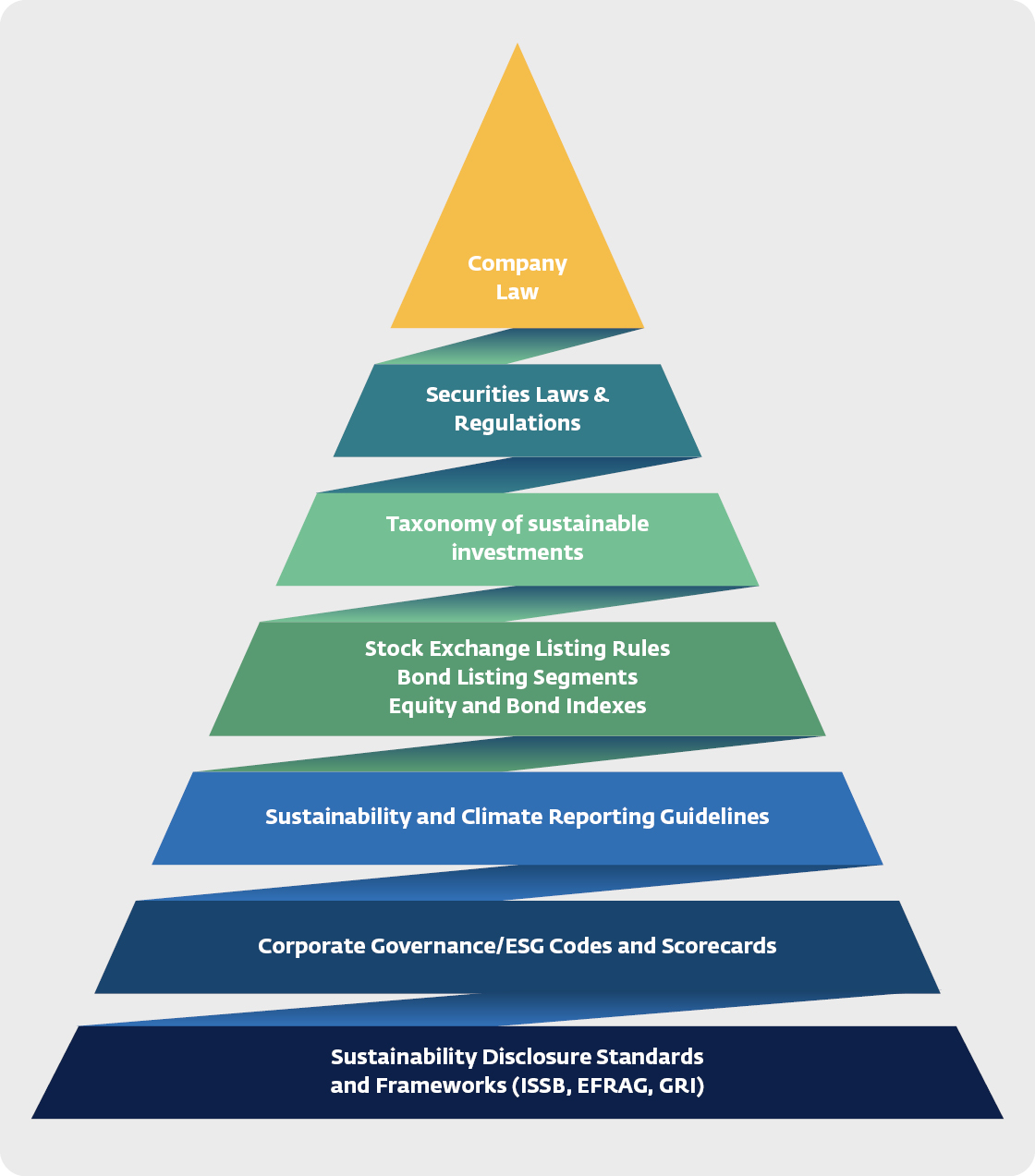
-
Laws And Regulation
Laws and regulations often provide the broad framework and principles for corporate governance and sustainability. Whether in commercial codes, securities laws, or banking regulations, these instruments can provide the fundamental elements that are then developed in more detail through other more flexible mechanisms, including corporate governance codes, scorecards, and sustainability reporting guidelines.
-
Corporate Governance and Sustainability Codes
Corporate governance codes have emerged as a key element of the corporate governance reform movement. Codes are typically “soft law”—companies are not required to implement the rules but are required to disclose to the market when they do not (the so-called “comply-or-explain” approach). Comply-or-explain codes are more flexible than fully mandatory systems, allowing companies to opt out of the code provisions. The comply-or-explain approach reduces the regulatory burden and avoids a one-size-fits-all approach. Sustainability practices are increasingly integrated as part of corporate governance codes and moving toward ESG and sustainability codes.
Learn More:
-
ESG Scorecards
ESG scorecards can help stock exchanges and regulators assess observance of corporate governance and ESG codes and standards. Scorecards can also help companies and banks analyze gaps and shortcomings in their corporate governance practices against national standards. Investors can use scorecards to guide their analysis of corporate governance practices in the companies in which they invest.
-
Sustainable Finance and Taxonomies
Sustainable finance frameworks can help countries ensure the consistency, completeness, and coherence of various pieces of their regulatory and quasi-regulatory arsenal to ultimately promote corporate sustainability and sustainable finance. Taxonomies are often at the center of sustainable finance frameworks, providing a common definition of sustainable activities for various related market activities, sourcing sustainable finance, annual reporting, and ongoing investor relations.
-
Listing Segments And Indexes
Separate listing segments or financial indexes focused on sustainability can play a major role in driving corporate progress and they are typically linked to existing regulations or standards for corporate governance and sustainability reporting.
-
Sustainability and Climate Reporting Guidelines Content
Sustainability and climate reporting guidelines help countries raise their overall standards of corporate disclosure and transparency and attract investments through credible, comparable, decision-useful information. ESG reporting complements financial reporting with critical information on stakeholders, sustainability matters, and corporate governance that can affect the company and the communities and society around it.
Investors are increasingly interested in companies engaged in sustainable business activities. They want to understand how companies tackle issues such as climate change, gender diversity, or supply chain risks that may have a material impact on their business. Harmonizing sustainability disclosure standards will create reliable and comparable ESG data and disclosures, which is becoming more critical to attracting capital and investors and preventing greenwashing. The new International Sustainability Standards Board (ISSB) Sustainability and Climate Disclosure Standards and the European Sustainability Reporting Standards (effective January 2024 ) is a welcome step toward consolidating multiple standards and frameworks.
ACCESS TO
Coming Soon: Database of IFC's Work
This database highlights IFC’s work with regulators, stock exchanges, and capital market stakeholders around the world on developing, implementing, and assessing laws and regulations, codes or corporate governance, scorecards of best practices, and ESG Reporting Guidelines.
REGULATORS AND STOCK EXCHANGES
Resources
This platform provides useful tools, resources and examples for regulators and stock exchanges to develop a complete and coherent regulatory framework around corporate governance and sustainability, and to promote a strong culture of transparency and disclosure.
-
Corporate Governance and Sustainability Codes
Toolkit on Developing Corporate Governance Codes
Globalization of economies has increased, and international corporate guidelines have been adopted, but each country has its own values, societal norms, way of doing business, and special circumstances. Thus, every country should develop its own corporate governance code to guide policy makers, market players, and corporations in adopting sound corporate governance practices at the local level. The toolkit provides a step-by-step approach that could stakeholders can follow to develop, implement, and review a Corporate Governance Code of Best Practice.
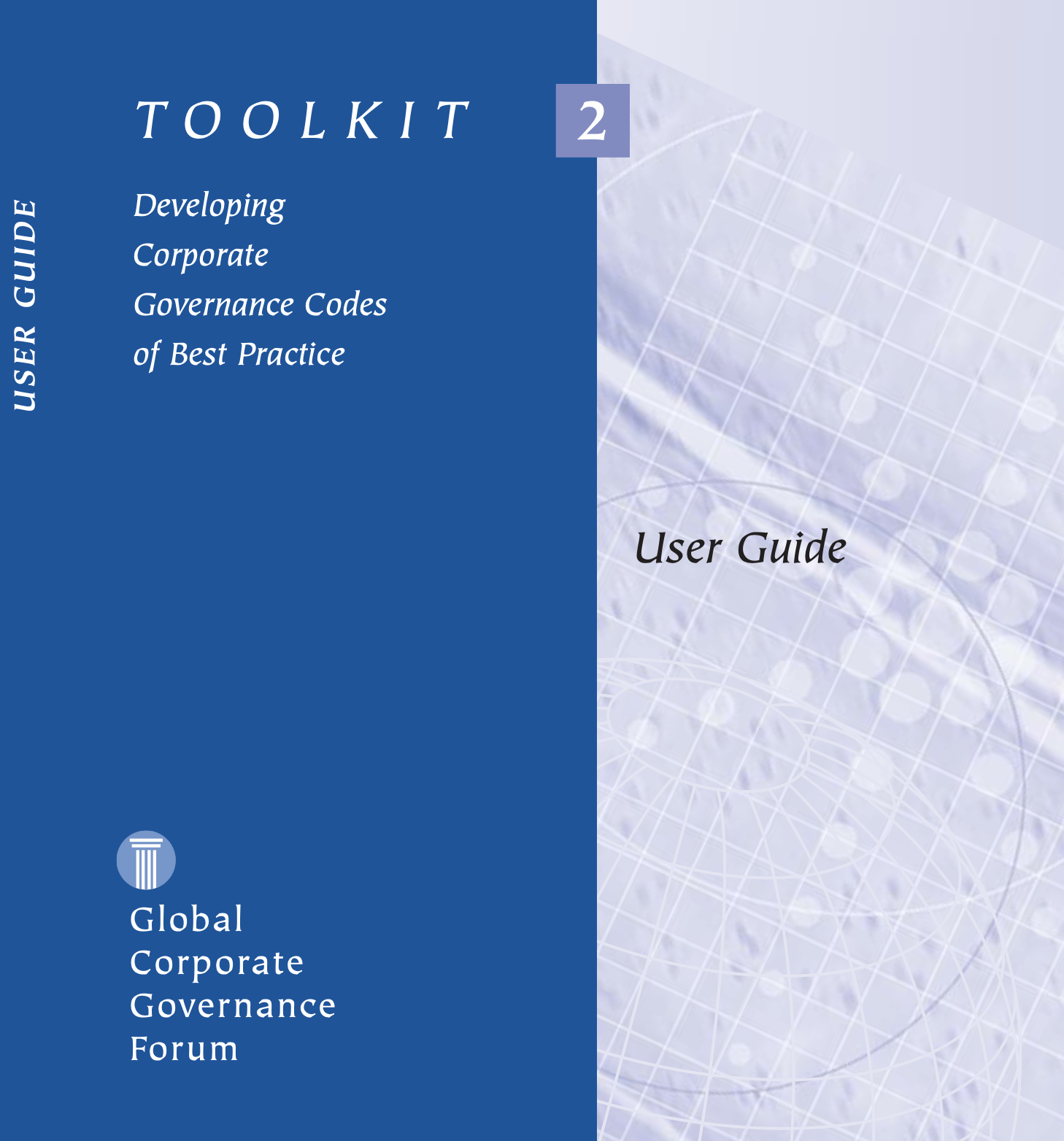
-
Corporate Governance and ESG Scorecards
Developing Corporate Governance Scorecards
Toolkit on Developing Corporate Governance Scorecards
This publication focuses on how to use scorecards to measure the observance and implementation of corporate governance codes. It provides practical guidance and a step-by step approach on how to develop a corporate governance scorecard, presents different approaches to scorings based on the experience of different scorecard users in different countries, and shows how scorecards are adapted to local circumstances and the local corporate governance framework.
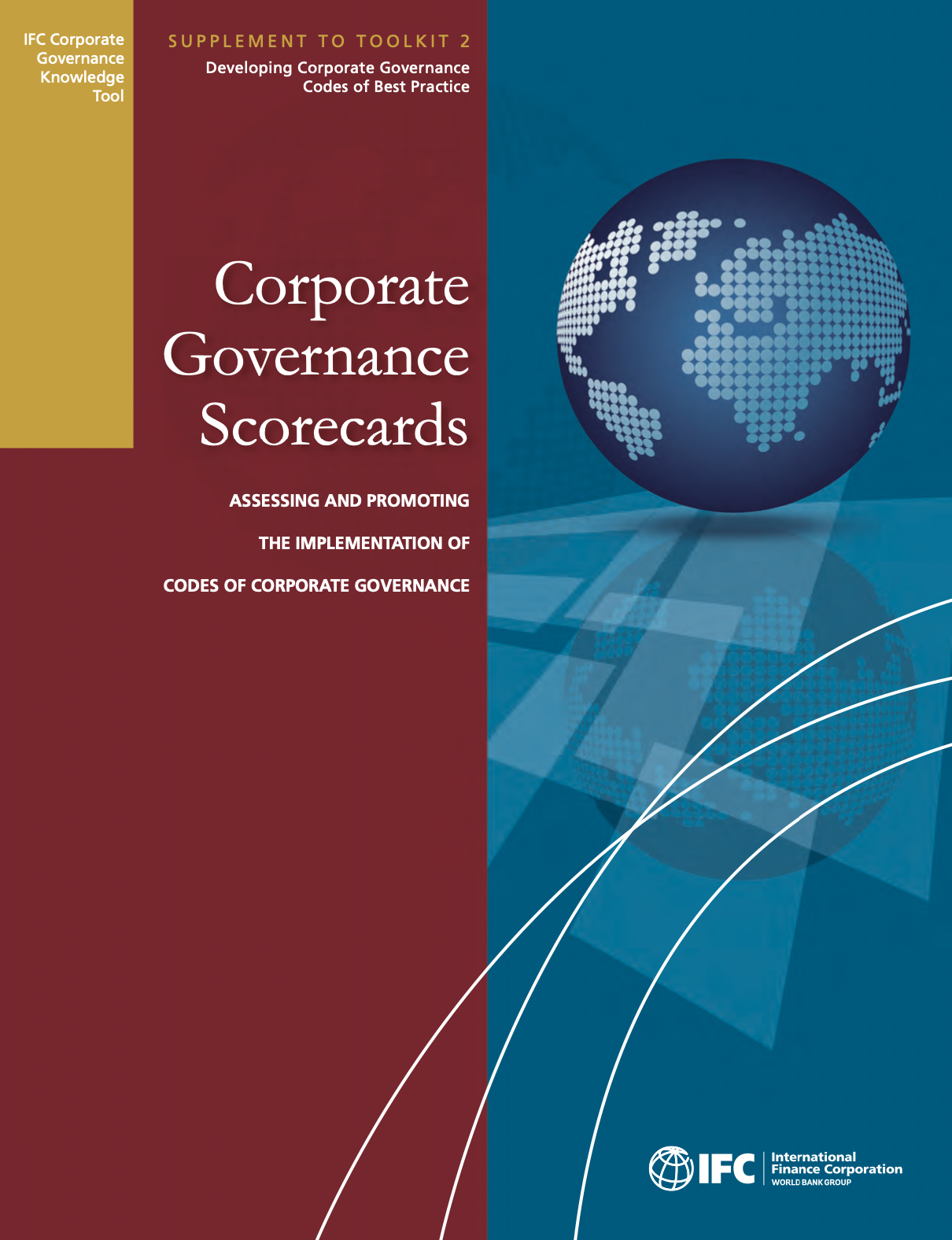
Other Resources
- Model ESG Scorecard for Listed Companies (XLS), Methodology (Word);
- Model ESG Scorecard for Banks (XLS), Methodology (Word);
- Corporate Governance Scorecards, IFC Presentation (PPT).
The documents are available at the google drive: https://drive.google.com/drive/folders/1S_hF0KKEFwFnH2KmTqUIu3Jue9Prk-L9
-
Beyond the Balance Sheet Disclosure and Transparency Toolkit
Toolkit for Disclosure & Transparency
The toolkit supports the broader World Bank Group’s effort to enhance disclosure and transparency standards in developing countries. It provides guidance on preparing comprehensive and integrated annual reports that include critical environmental, social, and governance information to companies, stock exchanges, market regulators and investors alike.

-
Model ESG Guidance and Regulation
Link to comprehensive databases of securities regulator instruments and ESG disclosure guidance maintained by our partner the Sustainable Stock Exchanges Initiative (SSE). This includes corporate governance codes, reporting requirements, green and sustainable bond standards, investor stewardship codes and regulation.
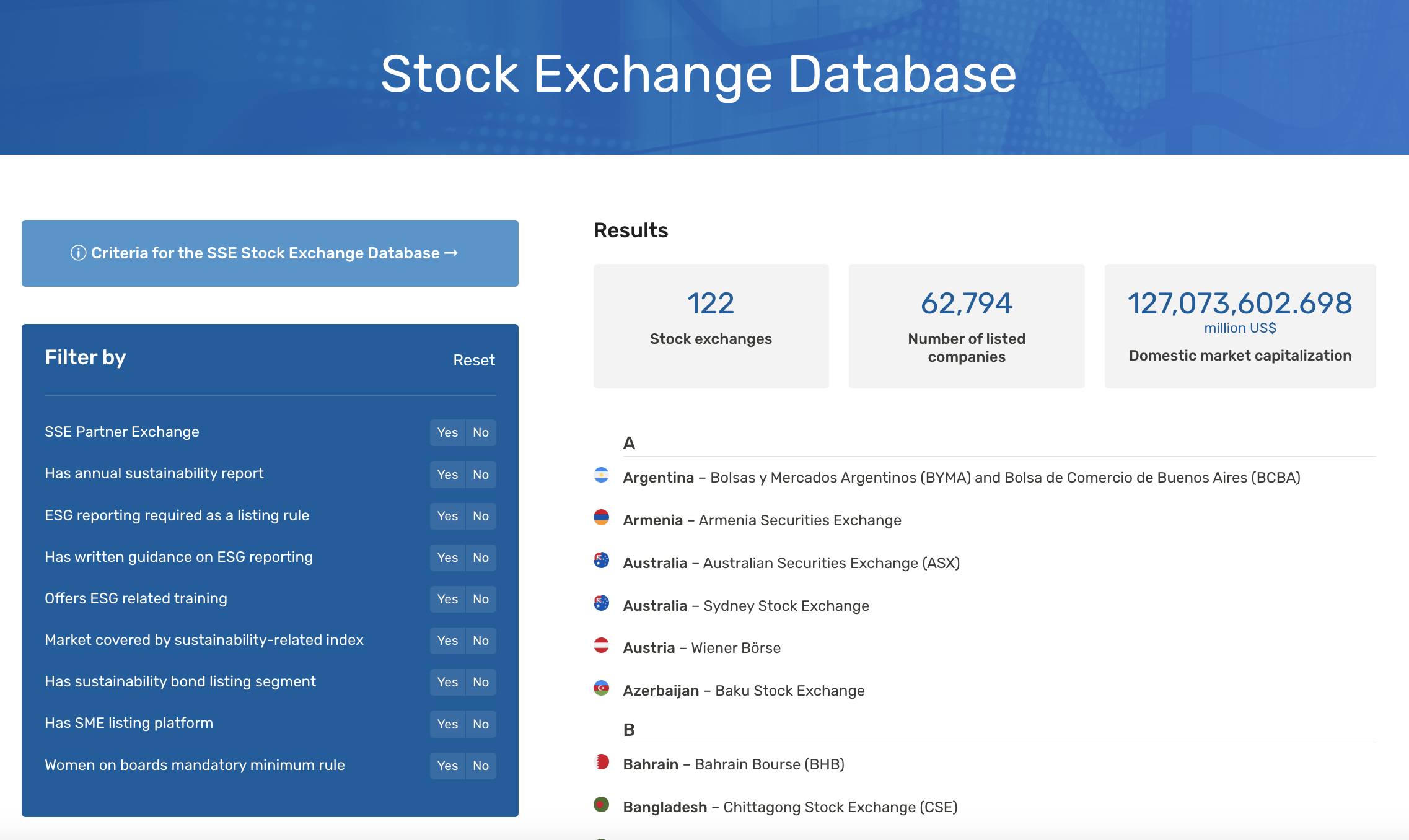
-
Beyond the Balance Sheet Interactive Course: Sustainability and Climate Reporting Essentials
This flexible, interactive course, which will be available in September 2023, provides guidance, examples, and self-check activities to help you integrate high-quality information into sustainability and climate reporting.
Four engaging modules are designed to strengthen your company’s disclosures on strategy, governance, risk management, and performance metrics and targets.Our aim: not more reporting but better reporting.
Essential reporting, better results!
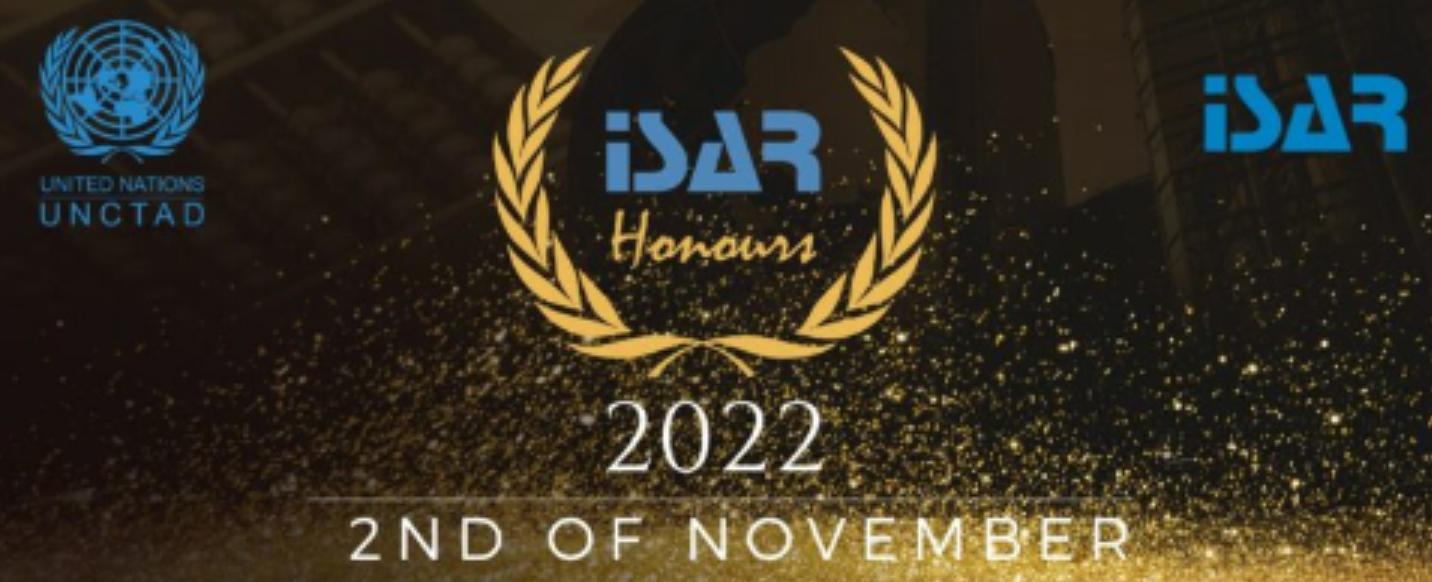
IFC and the World Bank won the United Nations Conference on Trade and Development’s ISAR Honours 2022 in the International Category for the initiative “Improving Sustainability Reporting in Emerging Markets.” ISAR (International Standards of Accounting and Reporting) Honours seeks to draw attention to organizations’ efforts globally to promote and harmonize sustainability and Sustainable Development Goals reporting.
WATCH THE VIDEO ABOUT THE PROGRAM.